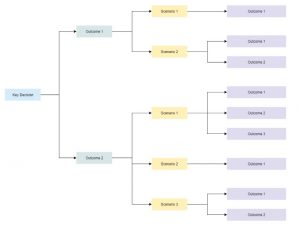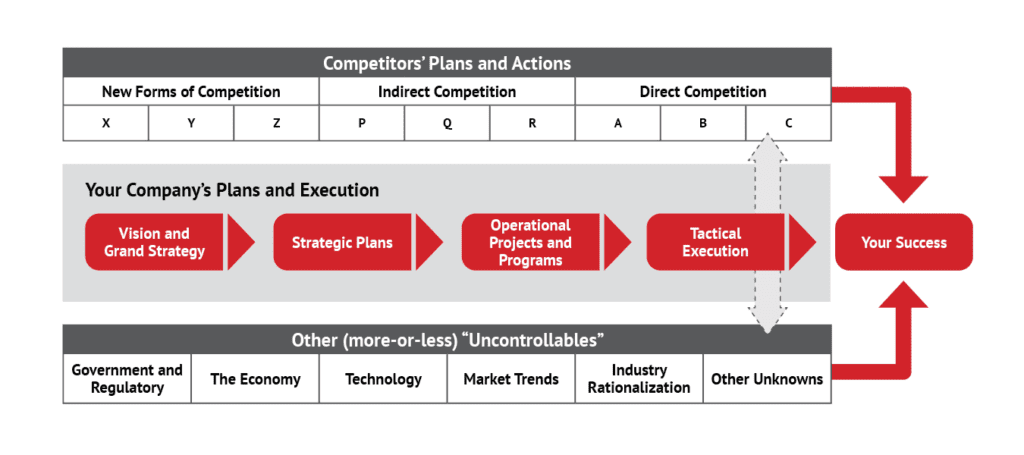Do you ever find yourself in a situation where you’re unsure what to do next? If so, then business wargaming may be for you! Business wargaming is a strategy simulation tool that helps business owners make better decisions by allowing them to visualize different scenarios and their outcomes.
A war game workshop is a strategic tool for businesses to foster creativity, challenge existing processes, and gain competitive advantages.
This article will discuss business wargaming and how to use it as a strategic tool to improve your business!
The military first used wargaming to help plan and prepare for battle. Business wargames are a variation of this concept developed specifically for businesses. It allows business owners to visualize different scenarios and their outcomes, which helps them make better decisions.
It differs from traditional strategic planning in many ways - primarily focusing on the behavior of other market stakeholders such as competitors, regulators, and the economy.
Understanding Business Wargaming
Business wargaming is a strategic simulation tool designed to help businesses make informed decisions by visualizing different scenarios and their potential outcomes.
This process involves simulating market conditions to identify strengths and weaknesses in a business strategy, allowing companies to test and refine their plans against real-world challenges. Business wargaming is not just a static exercise but a dynamic and interactive process that encourages cross-departmental communication, sparks creativity, and challenges the status quo.
Companies can better prepare for future uncertainties and enhance their strategic planning efforts by engaging in business wargaming.
Origins of Wargaming
Wargaming has its roots in the military, where it was originally used to prepare for battle and anticipate potential outcomes.
Over time, this concept has been adapted for business use, helping companies refine their strategies and predict their competitors’ next moves. While the term “war game” might evoke images of conflict, it represents a collaborative and interactive process to make better strategic decisions in the business context.
Business wargaming leverages the same principles of anticipation and preparation used in military wargames but applies them to the competitive business environment.
Goals of a Business Wargame
The primary goals of a business wargame include:
- Identifying potential risks and opportunities: By simulating different scenarios, businesses can uncover potential threats and opportunities that may not be immediately apparent.
- Developing a competitive strategy: Business wargaming helps companies craft robust and adaptable strategies to changing market conditions.
- Improving market understanding: Through the simulation of market dynamics, businesses gain deeper insights into their competitive environment.
- Enhancing collaboration and communication among team members: Wargaming's interactive nature fosters teamwork and improves communication across departments.
By achieving these goals, businesses can gain a competitive advantage, improve their strategic thinking, and make more informed decisions. This process helps craft better strategies and build a more cohesive and agile organization.
What are the different types of business war games?
There are two main types of business wargaming:
A 'war game workshop' is a structured environment where diverse participants engage in role-playing scenarios, allowing insights into market dynamics and decision-making strategies.
The first type is competitive wargaming, which simulates market competition to anticipate competitors' moves and strategies. The second type is collaborative wargaming, which aims to improve internal processes and team collaboration by simulating various business scenarios.
Scenario wargaming:
This type of business war game allows business owners to explore different scenarios and their outcomes. This can be helpful for strategic planning decisions about product launches, mergers and acquisitions, and marketing campaigns.
Tactical games can be used to evaluate the likelihood of success for a given scenario. Scenario wargaming can be effectively conducted in a 'war game workshop' setting, providing a structured environment for exploring different scenarios.
Strategic wargaming:
This type of war game helps businesses make long-term decisions about their business model and competitive strategy. Strategic business war games can be an important component of a competitive intelligence plan.
Strategic wargaming can also be conducted in a 'war game workshop' to facilitate long-term decision-making and competitive strategy development.
There are a few things you need to keep in mind when using business wargaming:
- Make sure you have a clear goal for the simulation.
- Be realistic in your assumptions and calculations.
- Be prepared to make changes to your plan based on the simulation results.
You can see what strategies work and which don’t by observing different scenarios. This information can help you make better decisions about competing in the market and staying ahead of the curve.
Tactical Games
Tactical games are a type of business wargame that focuses on specific issues or problems within a business context. Unlike strategic games with a broader scope, tactical games are more narrowly focused and are used to test a few small tactics and anticipate competitor counteractions.
These games can be run separately or as part of a larger business simulation, providing valuable insights into the likelihood of success for a given scenario.
Using tactical games, businesses can refine their strategies, identify weaknesses, and develop more effective plans. This targeted approach allows companies to address specific challenges and improve their strategic planning.
The next section will explore the different types of business wargames, including strategic and tactical games, and how they can achieve business objectives.
Who is a good fit for a business war game?
Do you have what it takes to be a successful business wargamer?
To get the most out of a business war game, you need to be able to think strategically and make realistic assumptions.
You must also be prepared to change your plan based on the simulation's results. If you can do all that, then business wargaming may be right for you!
War games are more successful when an organization can access market research and competitive intelligence, which helps inform the teams about their markets, brands, and competitors.
Participating in a war game workshop can help individuals and organizations gain practical insights and improve their strategic thinking.

What are business wargames used for?
War gaming can be used in several ways, such as forecasting demand, testing new products or services, creating a competitive advantage, or assessing the impact of mergers and acquisitions. It can also help identify potential problems before they become too costly or difficult to fix.
Some other purposes of wargames are :
- To improve decision-making
- To identify and assess risk
- To evaluate business models
- To develop competitive strategies
- To deeply analyze the competitive environment
- To apply sophisticated market research
- To develop competitive intelligence
How are wargames different than scenario planning?

Scenario planning is a process that makes assumptions about the future and how your business will be affected. Scenario planning does not delve into the behavior of external players in the same way a war game does.
A business war game can help you better understand the competitive background and how your company compares.
Competing companies can be used as allies or enemies in the game, giving you a better understanding of how strategic initiatives might work in certain situations.
A war game can explore the competitive dynamics of your marketplace in much more depth than any other method.
A business wargaming exercise can be an opportunity for team building. Participants will need to work together to be successful and achieve the game's objectives, which can help build trust and cooperation within your team.
How does the wargame process work?
Business wargaming is a strategic simulation process that can be summarized into three steps: setting the game up, running the game, and getting insights from the game.
Most wargame projects are run as role-playing sessions in at least two separate games. Its overall purpose is to help a business make informed decisions.
To set up a successful business wargame, you must define the game's objectives, identify the players, and determine the scenario.
The next step is to run the game by simulating different strategic moves and tracking the outcomes.
Finally, you need to analyze and discuss the game's results with your team to get insights that can help improve your business.
War games are usually conducted with several different cross-functional teams representing:
- a market team who is responsible for playing the role of customers and representing their interests. The market team plays a very important role that is often overlooked;
- a competitor team, which role plays the actions of your most significant competitors. There may be up to three competitor teams in a war game.
- a company team, who is responsible for playing the role of the business;
- a control team, which is responsible for recording and interpreting the results of the game;
- and a referee who oversees the game and ensures that everyone follows the rules.

War games can also help build team morale by allowing employees to work together towards a common goal. This type of activity can help strengthen relationships between senior managers and their team members and encourage increased communication between team members.
The insights gained from a business war game can help you make better decisions about your company's future and stay ahead of the competition.
The next step is to implement the insights gleaned from the wargaming exercise. This may involve changes to business processes, policies, or even the overall strategy.
Everyone involved in the wargame must understand what actions need to be taken based on the results so that they can continue implementing them after the game is over.
Business wargaming is a powerful tool for evaluating the business situation and improving decision-making.
It allows managers to test their assumptions about how their business works and identifies potential problems before they become actual problems.
This isn't always easy, though; change can be difficult for organizations of any size. But if you want your company to stay ahead of the competition, you must constantly look for new ways to improve. And what better way to do that than by using insights from a business wargame?

What are the benefits of business wargaming?
There are many benefits to using business war gaming as a tool for strategic thinking. Some of the key benefits include:
- improved decision-making
- a better understanding of the competition
- increased team morale and cooperation
- insights that can help improve business processes, policies, and strategy.
Strategy is often a core competency of companies, but wargames are not commonly used. A war game can be a real game-changer for a company that must evaluate the competitive setting and anticipate the potential outcomes of various actions.
How can I get started?
Several different software packages allow you to run business war games. The most popular ones are:
Each package has strengths and weaknesses, so you must decide which is right for you. You can also find some business wargaming templates online that you can use as a starting point for your simulations.
However, one of the best ways to benefit from a business war game is to engage a consulting agency like Asymmetric with experience in this field. They can help you set up a wargaming workshop, run it, and analyze the results.
Business wargame resources
If you want to run a war game for your organization, there are a few resources you can use to get started.
Wargames can play a major role in company leadership development. The Harvard Business Review wrote an excellent article titled "Wargaming Is More than a Rehearsal" that examined the role of war games in the military.
Daniel F. Oriesek, a Principal with A.T. Kearney in Switzerland, wrote an excellent primer on business wargaming titled "Business Wargaming—Securing Corporate Value."

If you're looking for something more hands-on, some companies offer training in business wargaming. These courses give participants the skills and knowledge to run a successful war game.
So, whether you're just getting started or looking for more advanced resources, there's something out there for everyone interested in business wargaming.
Finally, business wargaming is an invaluable tool for improving decision-making in businesses of all sizes. If you're looking for a way to get insights you can't find anywhere else, this is the tool for you!
The role of war games in strategy planning
War games have been used for centuries to train commanders in the art of war. But these days, businesses are using war games to help with strategy.
What is business strategy planning?
Business strategy planning defines a company's long-term goals and develops a plan to achieve them. This includes identifying the resources needed, setting deadlines, and allocating responsibilities.
Often, a strategic game can help a company illustrate the impact of a range of strategy options. The use of wargames can drive an improvement in strategic thinking in an organization.
A war game can be a real game-changer for a company that must evaluate the competitive landscape and anticipate the potential outcomes of various actions.
A business wargame can help a company overcome existing mental models and think creatively to address highly complex situations. Cognitive barriers and conventional wisdom are often key obstacles to developing an effective strategic plan.

Next steps
Whichever route you choose, I'm sure you will find that business strategy development using war games can be an extremely valuable tool for improving your understanding of how businesses operate and making better decisions.

Frequently Asked Questions (FAQ): What Is a Business Wargame?
What exactly is a business wargame?
A business wargame is a strategic simulation where key stakeholders participate in a scenario designed to test and challenge business strategies. Typically, participants role-play as their own company or as competitors, exploring how different decisions impact outcomes in various competitive or market environments. The purpose is to anticipate challenges, discover new opportunities, and prepare for unexpected disruptions.
Who should participate in a business wargame?
Ideally, a mix of senior leaders, department heads, and key decision-makers from across your organization should participate. Involving diverse perspectives from marketing, sales, operations, and finance helps ensure the simulation captures the complexity of real-world business scenarios. Sometimes, even external experts or consultants are brought in to play roles as competitors or market forces.
What are the benefits of running a business wargame?
Business wargames help companies test their strategies in a low-risk environment. The main benefits include:
- Identifying weaknesses in current strategies.
- Gaining insights into competitor behavior.
- Encouraging innovative thinking.
- Preparing for potential industry changes or disruptions.
- Strengthening internal alignment on strategic goals.
How is a business wargame different from a business simulation?
While both business wargames and simulations model potential future outcomes, a wargame focuses more on competitive dynamics, emphasizing adversarial interactions. A business simulation, by contrast, often centers on internal decision-making processes or financial performance without the same focus on direct competition or market shifts.
How long does a business wargame typically last?
The length of a business wargame can vary depending on the scenario's complexity and the exercise's goals. They can last anywhere from a half-day session to a multi-day workshop. Some wargames may be part of a longer-term strategic planning process, broken into phases over weeks or months.
Can small businesses benefit from a business wargame?
Absolutely. Business wargames aren't just for large corporations. Small businesses can benefit by stress-testing their strategies, especially when entering new markets, launching products, or facing increased competition. The insights gained can help small businesses make more informed, confident decisions.
What types of scenarios are used in a business wargame?
Scenarios can vary widely depending on the company’s needs. Some common examples include:
- Market entry by a new competitor.
- Economic downturn or industry disruption.
- Technological advancement that changes the market landscape.
- A major shift in customer preferences or regulatory changes.
These scenarios are designed to challenge current strategies and encourage innovative thinking.
How often should a company conduct a business wargame?
It depends on your business needs, but companies often run wargames when significant market changes are anticipated or when developing long-term strategies. For example, conducting a wargame annually as part of your strategic planning process can help keep your business adaptable and prepared for new challenges.

Ready to Test Your Strategy with a Business Wargame?
Unlock Competitive Insights A well-executed business wargame can uncover valuable insights about your market, competitors, and strategy. Whether preparing for a new product launch, market expansion, or simply wanting to sharpen your competitive edge, a business wargame can help you stay one step ahead.
Let’s Work Together At Asymmetric Marketing; we specialize in helping businesses like yours run effective wargames that drive real strategic improvements. Let’s talk about how a tailored business wargame can reveal new opportunities for growth and help you prepare for the unexpected.
- Contact us today to discuss how we can design a custom wargame for your business. Click Here
- Schedule a consultation and get personalized advice from our expert strategists. Click Here
- Explore more insights about business wargaming and strategic planning on our blog: Click Here
Take your business strategy to the next level—be prepared, strategic, and ready for anything.
About the author
Mark A. Hope is the co-founder and Partner at Asymmetric Marketing, an innovative agency dedicated to creating high-performance sales and marketing systems, campaigns, processes, and strategies tailored for small businesses. With extensive experience spanning various industries, Asymmetric Marketing excels in delivering customized solutions that drive growth and success. If you’re looking to implement the strategies discussed in this article or need expert guidance on enhancing your marketing efforts, Mark is here to help. Contact him at 608-410-4450 or via email at mark.hope@asymmetric.pro.

